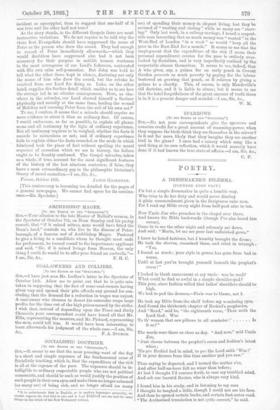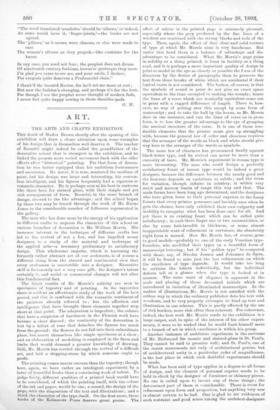POETRY.
A DRESSMAKER'S DILEMMA.
(FOUNDED UPON FACT.)
I'm but a simple dressmaker in quite a humble way, Who tries to do her duty and would never disobey A plain commandment given in the Scriptures unto men, For I read my Bible every night from half-past nine to ten.
Now Uncle Jim who preaches in the chapel over there, And knows his Bible backwards (though I've also heard him swear), Came in to me the other night and solemnly sat down, And said : "Maria, let me see your last unfinished gown."
I knew he hated fashions, but I humbly brought the dress ; He took the sleeves, examined them, and cried in triumph : "Yes, I feared as much ; your style in gowns has gone from bad to worse, Until at last you've brought yourself beneath the prophet's curse !"
I looked in blank amazement at my uncle : was he mad? What could he find so awful in a simple shoulder-pad P This year, since fashion willed that ladies' shoulders should be high, We had to pad the dresses,—Paris was to blame, not I.
He took my Bible from the shelf before my wondering eyes, And found the thirteenth chapter of Ezekiel's prophecies, And "Read," said he, "the eighteenth verse, Thus saith the Lord God : Woe To th' women that sew pillows to all armholes !' . . . . . Is it so ?"
The words were there as clear as day. "And now," said Uncle Jim, "Just choose between the prophet's curse and fashion's latest whim; 'Tis you Ezekiel had in mind, to you the Lord saith Woe !' If in your dresses from this time another pad you sew."
Thus saying he departed, and I turned the matter o'er, And after half-an-hour felt no wiser than before; At last I thought I'd venture forth, to ease my troubled mind, And ask our learnbd Rector, who is always very kind.
I found him in his study, and in listening to my case I thought he laughed a little, though I could not see his face. And then he opened certain books, and certain foot-notes read. "The Authorised translation is not quite correct," he said. "The word translated 'armholes' should be 'elbows,' or indeed, As some would have it, finger-joints,'—the books are not agreed.
The 'pillows,' as it seems, were charms, or else were made to ease The women's elbows as they prayed,—like cushions for the knees.
In any case, you need not fear; the prophet does not dream Of nineteenth-century fashions, howso'er grotesque they seem. I'm glad you came to see me, and your uncle, I declare, For exegesis quite deserves a Professorial chair."
I thank'd the learned Rector, for he'd set me more at rest ; But now the fashion's changing, and perhaps it's for the best, For though I see the prophet never thought of modern fads, I never feel quite happy sewing in those shoulder-pads.
G. H.







































 Previous page
Previous page